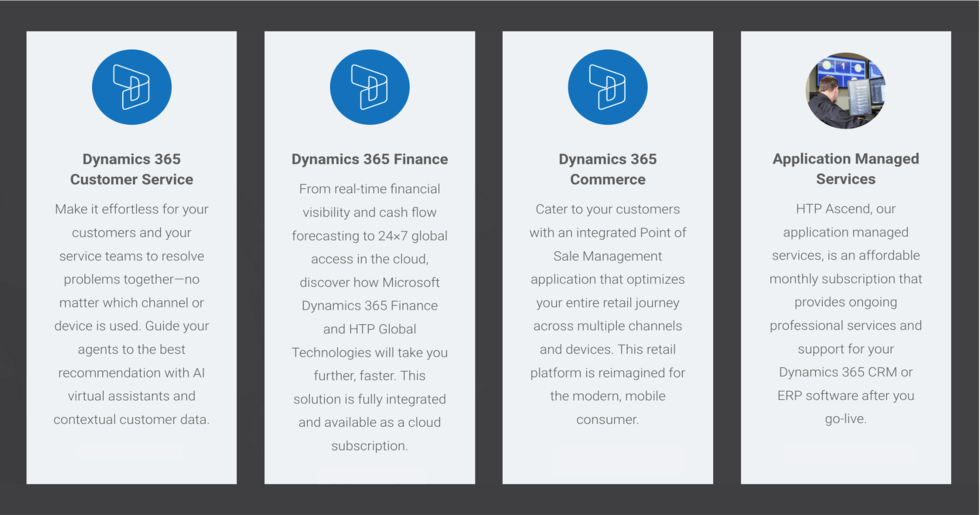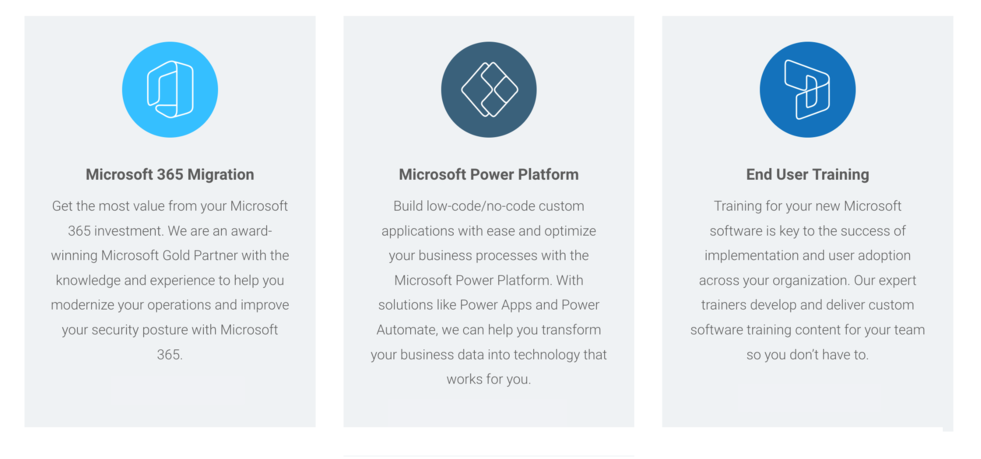Loading...

Professional implementation services for Microsoft cloud business applications. HTP GLobal Technologies has over 13 years of experience implementing scalable business applications for businesses and government entities. From ERP to CRM cloud software and beyond – we’ll help you modernize your technology for better security and productivity with a Microsoft Dynamics 365 implementation.
We specialize in Microsoft Dynamics 365 implementations

Additional Microsoft cloud implementation services

The next step after choosing Microsoft Dynamics 365 is to define the Dynamics 365 implementation timeline, as well as the processes. The actual implementation process and timeline for Dynamics 365 may differ greatly by project, depending on the application(s) selected and the complexity of your organization’s business processes. However, the steps outlined below are common for most Dynamics 365 implementations.
Planning, Analysis and Design Phase
Planning, the first phase of implementation, usually happens within the first 1-2 weeks. Then, the and Design phases take place to map out the implementation of Dynamics 365. At this stage, we will collaborate with your team to determine the desired configuration requirements, identified customizations, custom reports, integrations, interfaces, and the data migration strategy. The analysis and design phase of most Dynamics 365 implementations can take anywhere from a few weeks to a few months, depending on the scope of the project.
Development and Deployment Phase
The next phase after the design is to get down to Development. To make sure your Dynamics 365 implementation is successful, our team works to make sure the system is built and tested to reflect user-validated business processes defined during the Analysis and Design phases of the implementation.
During Deployment, we will validate the installation, data migration, settings, and security of your Dynamics 365 implementation. User Acceptance Testing (UAT) is also conducted in this timeframe, after which user training, core user training, and admin training will follow. The Development and Deployment phases can span a couple months or many, depending on the complexity of the implementation.
Go-Live and Performance Monitoring
This is the last stage of a typical Dynamics 365 implementation strategy. We transition to Go-Live after the Go-Live preparation steps have been completed. Our team will work with you to complete a multi-point inspection and sign-off.
After Go-Live, our implementation team will continue to provide your team with 30 days of extensive Go-Live Hypercare Support, answering your questions and resolving issues as they arise with Dynamics 365. If you have agreed to an ongoing HTP Ascend support contract, we will then transition you to our support team who will continue to provide help desk services and maintain your system with updates and upgrades.
Your Dynamics 365 implementation process and strategy will involve several aspects, such as defining your goals, identifying an internal team, assessing your existing systems and tools, implementation, and evaluation.
The following best practices will help lead to a successful Dynamics 365 implementation.
Collect and document key business processes Your ability to define the business processes that matter most to your operation are crucial to an impactful and successful Dynamics 365 implementation. These processes set the foundation for optimizing workflows and driving efficiencies for the future of your organization.
Create an internal team of experienced personnel: This is critical to the execution of your plans. This team must be ready to put in their best efforts and must understand your end-to-end business process to facilitate the best outcome for your implementation. This makes sure that no step is missed in the entire process.
Monitor and evaluate your implementation: Determine how you want to measure the success of the implementation. Ideally, your internal team should be familiar with the capabilities of Microsoft Dynamics 365 and capable of identifying whether your implementation is going as planned.
In most cases, your in-house team will need the support of experts in Dynamics 365 implementation to make your project successful, which is where HTP comes in.
With over 20 years of implementing Microsoft business applications for businesses and government entities, we have the experience to lead a successful Dynamics 365 implementation for your organization. Our team includes a Microsoft Fast Track Recognized Solution Architect, a designated Microsoft Most Valuable Professional (MVP), a Microsoft Certified Trainer, and a Microsoft Certified Educator. In addition, our staff has completed over 200 exams towards active Microsoft certifications.
HTP will partner with you to make sure you receive the support you need along the way. We bring our vast industry knowledge, management expertise, training and support solutions, and implementation methodology best practices to the table.
When you choose HTP for your Dynamics 365 implementation, you can expect quality professional services with a quality end product. HTP provides its employees with a path to greater pay, recognition, and responsibility. We mitigate employee migration to competing organizations by providing a supportive corporate culture, motivating work environments, performance-based incentive programs, and competitive salaries based on extensive and real-time research. In nearly all cases, the HTP IT personnel assigned to a contract on day one of contract award are the same personnel at project close-out.
Team up with HTP for your Dynamics 365 implementation.
We recommend choosing a timeframe where you will not feel rushed. Avoiding times of the year that overlap major holidays or busy periods for your team will help to keep your implementation project on schedule.
Most of HTP’s implementations can be completed remotely, so you won’t have to plan around travel or in-person meetings.
If you are migrating to Dynamics 365 from another system, consider when will be the best time to cut over from your existing system to the new one.
There are many factors that go into a price estimate for a Dynamics 365 implementation.
First, there is a subscription cost for Dynamics 365 licenses. Once you have determined the amount of users you need and the level of license per application(s), then you can calculate the cost for licensing. Dynamics 365 is a Software-as-a-Service model, meaning you will pay a per-user/per-month fee to use the software. The benefit of a SaaS solution is that you’re always working on the latest version of the software, and ongoing software updates/upgrades are included in the cost. The price per license will vary depending on the application and level of functionality needed.
There is also a cost for server(s), hardware, environment(s), and database(s) depending on the scope and requirements of your project. These components can vary between one-time costs and on-going subscriptions.
Lastly, there is a cost for services. At HTP, we build our implementation project pricing using a defined set of categories such as
1. Project management
2. Software customization
3. Data conversion/migration
4. Training
5. Travel (if needed)
We hire and retain quality Microsoft-certified team members to perform the work, so you can feel confident in partnering with HTP.
HTP consistently completes your projects on time and within budget while fully meeting project requirements, providing oversight, and reporting on project processes, metrics, risks, scheduling, and performance. This enables us to tailor our management approach to reduce overhead and costs while still providing a methodical approach with control gates for your Dynamics 365 implementation.